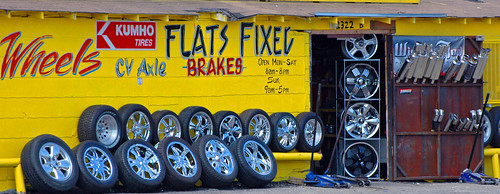Trailblazer! To protect ailing tire industry, U.S. imposes stiff tarriff on Chinese tires; Move infuriates Chinese government
(Sources contributing to this hybrid report: Marketwatch; Associated Press Washington Post; & CNN)
President Barack Obama signed an order on Friday to impose the special punitive tariffs for three years, the White House announced. The action is the first major trade enforcement action of his presidency and comes less than two weeks before a high-profile summit of the leaders of the Group of 20 nations, including China.
It is the first time the U.S. government has imposed special “safeguard” provisions to protect a U.S. industry from Chinese competition..
“The president decided to remedy the clear disruption to the U.S. tire industry based on the facts and the law in this case,” White House spokesman Robert Gibbs said in a statement.
Obama had until this coming Thursday to accept, reject or modify a U.S. International Trade Commission ruling that a rising tide of Chinese tires into the U.S. hurts American producers. The United Steelworkers blames the increase for the loss of thousands of American jobs.
The federal trade panel recommended a 55 percent tariff in the first year, 45 percent in the second year and 35 percent in the third year. Obama settled on 35 percent the first year, 30 percent in the second and 25 percent in the third, White House press secretary Robert Gibbs said. The tariff would be on top of the current 4% tariff. The tariffs will take effect in 15 days.
U.S. imports of Chinese tires have risen from 14.6 million in 2004 to 46 million last year, accounting for about one-sixth of the U.S. market. Four U.S. tire plants have closed in the past two years, and more than 5,000 workers have lost their jobs.
President Barack Obama’s decision to impose trade penalties on Chinese tires has infuriated Beijing at a time when the U.S. badly needs Chinese help on climate change, nuclear standoffs with Iran and North Korea and the global economy.
The decision comes as U.S. officials are working with the Chinese and other nations to plan an economic summit in Pittsburgh on Sept. 24-25 of the 20 leading rich and developing nations. China will be a major presence at the meeting, and the United States will be eager to show it supports free trade.
Governments around the world have suggested the U.S. talks tough against protectionism only when its own industries are not threatened. U.S. rhetoric on free trade also has been questioned because of a “Buy American” provision in the U.S. stimulus package.
China condemned the White House’s announcement late Friday as protectionist and said it violated global trade rules. At home, the punitive tariffs on all car and light truck tires coming into the U.S. from China may placate union supporters who are important to the president’s health care push.
Chen Deming, China’s minister of commerce, said the penalties would hurt relations with the U.S. A ministry statement said Obama had “compromised to the political pressure of the U.S. domestic trade protectionism.” “The Chinese government will continue to uphold the legitimate interests of China’s domestic industry and has the right to take corresponding measures,” Deming said.
For the Chinese government, the tire dispute threatens an economic relationship crucial to China’s economic growth. There was speculation before the decision that new tariffs could produce public pressure on Beijing to retaliate, potentially leading to a trade war. Chinese leaders have in the past expressed displeasure about a possible tire tariff.
“We hope the U.S. government will refrain from taking action, for the long-term healthy and stable development of U.S.-Chinese relations,” Fu Ziying, China’s vice commerce minister, told local media in August.
China’s Ministry of Commerce said in a statement early Saturday that the move violated WTO rules. “China strongly opposes this serious act of trade protectionism by the U.S,” the ministry said, according to the Associated Press.
China agreed to the provision while negotiating to join the World Trade Organization, but until Friday the general “safeguard” provisions of the law had never been invoked. Critics warned that if the general “safeguard,” which expires in four years, was never used to protect American workers from Chinese imports, then political support for free trade would be eroded.
“Since China joined the WTO, American workers have not been assured that the government would defend them against unfair trade,” Sen. Sherrod Brown (D-Ohio) said. The tariff, which will take effect Sept. 26, represents the first such case under the law for Obama, and his decision has been highly anticipated.
During the campaign, he had pledged to “crack down on China” and “work to ensure that China is no longer given a free pass to undermine U.S. workers,” as his Web site put it.
The tariff’s detractors said higher tire prices could lead some consumers to wait longer before replacing tires, creating a safety risk. Moreover, they said, the tariff won’t result in more jobs. Tires will simply come in from other low-cost countries, they say, and U.S. manufacturers, keep making their cheaper tires in China.
“U.S. tire manufacturers years ago decided to move production of low end tires off-shore,” said David Spooner, a lawyer representing the Chinese tire industry. “Frankly, a temporary tariff is not going to get them to change their business plan.”
Click here to read the entire article.


